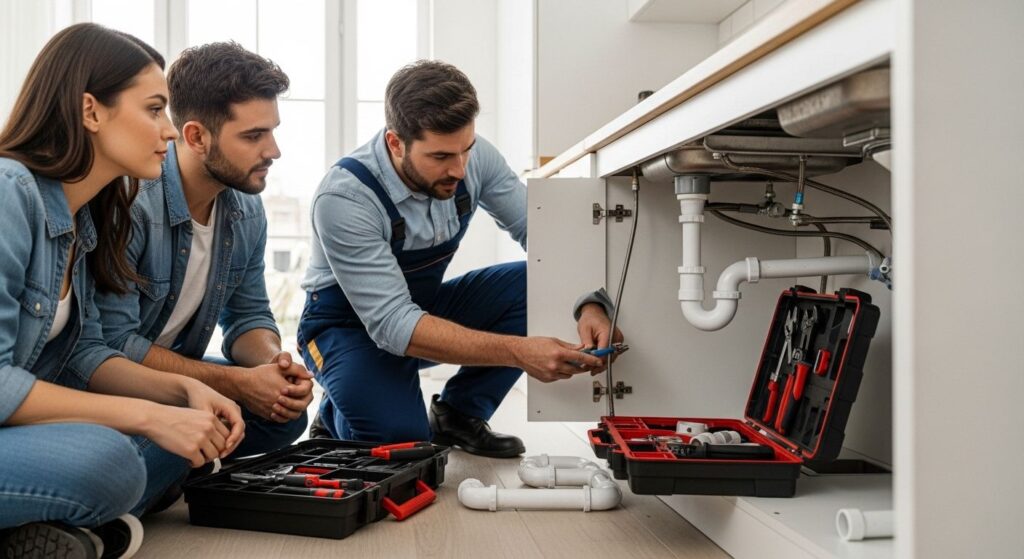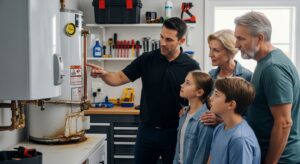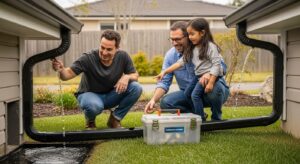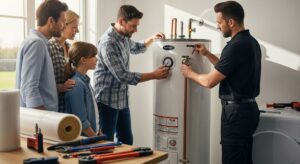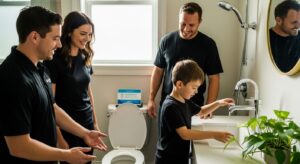Most people never give their plumbing a second thought until something goes wrong. Yet homeowners can lose about 10,000 gallons of water every year due to hidden leaks in their homes. Oddly enough, it’s usually the small problems you ignore that cause the priciest disasters down the road.
Table of Contents
- Understand Your Plumbing System Basics
- Regularly Check for Leaks
- Know How to Shut Off Water Supply
- Maintain Your Drains and Prevent Clogs
- Use Proper Fixtures and Fittings
- Insulate Pipes to Prevent Freezing
- Schedule Routine Professional Inspections
- Upgrade to Water-Efficient Fixtures
- Be Aware of Local Plumbing Codes
- Keep an Emergency Plumbing Kit Ready
Quick Summary
| Takeaway | Explanation |
|---|---|
| Understand Your Plumbing Basics | Familiarize yourself with key components like shutoff valves and water heaters for effective maintenance. |
| Regularly Inspect for Leaks | Check common leak areas like under sinks and around toilets to prevent costly water damage. |
| Know How to Shut Off the Water | Locate and understand your main water shutoff valve to quickly prevent potential water damage in emergencies. |
| Schedule Professional Inspections | Regular evaluations by plumbing professionals can identify minor issues before they become major problems. |
| Prepare an Emergency Plumbing Kit | Keep essential tools and materials handy to address unexpected plumbing issues and mitigate damage. |
1: Understand Your Plumbing System Basics
As a homeowner, understanding the fundamental components of your plumbing system is crucial for effective maintenance and preventing potential costly repairs. Your home’s plumbing network is a complex infrastructure that silently supports your daily activities, delivering clean water and removing waste efficiently.
A typical residential plumbing system consists of two primary subsystems: the water supply system and the drainage system. The water supply system brings fresh, potable water into your home, while the drainage system removes wastewater and sewage. Each system plays a critical role in maintaining your home’s comfort and hygiene.
Key components of your plumbing system include:
-
Main water shutoff valve: Located where the main water line enters your home, this valve allows you to stop all water flow during emergencies
-
Water heater: Responsible for providing hot water throughout your home
-
Pipes: Typically made of copper, PVC, or PEX, these transport water to different areas of your house
-
Fixtures: Sinks, toilets, showers, and other points where water is accessed or discharged
Understanding these basics helps homeowners recognize potential issues early. Learn more about local plumbing system intricacies specific to Ottawa’s unique infrastructure and climate conditions.
Regular visual inspections can help you identify potential problems before they escalate. Look for signs of water damage, listen for unusual sounds in pipes, and monitor water pressure. Minor leaks or unusual sounds can indicate underlying issues that might require professional attention.
By developing a basic understanding of your home’s plumbing system, you become proactive in maintenance, potentially saving significant money and preventing disruptive emergency repairs.
2: Regularly Check for Leaks
Leaks are silent home destroyers that can cause significant damage if left undetected. Water damage from unnoticed leaks can result in costly repairs and potential structural issues for homeowners. Regular leak detection is not just about preventing water waste, but also about protecting your property’s integrity.
Spotting hidden water damage early requires a systematic approach and keen observation. According to the Environmental Protection Agency, households can lose approximately 10,000 gallons of water annually due to undetected leaks.
Common areas to inspect for potential leaks include:
-
Under sinks: Check pipe connections and cabinet bottoms for moisture
-
Around toilets: Look for water pooling or discoloration at the base
-
Water heater: Examine the area around the tank for dampness or rust
-
Basement and crawl spaces: Watch for unexplained moisture or water stains
Warning signs of potential leaks involve more than just visible water. Pay attention to:
-
Unexplained increases in water bills
-
Musty odours in specific areas of your home
-
Sudden drops in water pressure
-
Unusual sounds like constant dripping or running water
If you discover a leak, take immediate action. Small leaks can quickly escalate into major plumbing emergencies. Turn off the water supply to the affected area and contact a professional plumber for a thorough assessment.
Preventative maintenance is always more cost effective than emergency repairs. By dedicating time to regular leak inspections, you can save money, preserve your home’s structural integrity, and contribute to water conservation efforts.
3: Know How to Shut Off Water Supply
Knowing how to quickly shut off your home’s water supply can prevent catastrophic water damage during plumbing emergencies. Every homeowner should be familiar with the location and operation of their main water shutoff valve before a crisis occurs.
According to the Western Municipal Water District, understanding your water shutoff mechanism is critical for minimizing potential property damage. Most residential water valves are located in specific areas:
-
Exterior of the home: Often near the foundation or property line
-
Basement or crawl space: Typically where the main water line enters the house
-
Garage or utility room: Common alternative locations
Types of main water shutoff valves include:
-
Gate valves: Older style with a wheel-like handle
-
Ball valves: Modern quarter-turn valves with a lever handle
Learn more about valve replacement strategies to ensure your home’s water control system remains functional.
When turning off the main water valve, follow these crucial guidelines:
-
Turn the valve slowly to prevent sudden pressure changes
-
Ensure all household members know the valve’s location
-
Keep the area around the valve clear and accessible
-
Consider labeling the valve for quick identification
Emergency scenarios requiring immediate water shutoff include significant pipe leaks, burst pipes, or when performing major plumbing repairs. By familiarizing yourself with your home’s water control mechanism, you can act swiftly and confidently during unexpected plumbing incidents, potentially saving thousands in water damage repairs.
4: Maintain Your Drains and Prevent Clogs
Drain maintenance is a critical aspect of home plumbing care that can save homeowners significant time and money. Preventing clogs requires proactive strategies and understanding what materials can damage your plumbing system.
According to the City of Fresno, certain substances should never enter your drains. Fats, oils, and grease (FOG) are primary culprits in creating stubborn blockages that can lead to expensive repairs.
Substances to avoid putting down your drains include:
-
Cooking oils and grease
-
Coffee grounds
-
Eggshells
-
Kitty litter
-
Hygiene products
Explore our comprehensive drain cleaning guide to learn more about protecting your home’s plumbing infrastructure.
Preventative techniques can help maintain clear drains:
-
Use drain strainers to catch food particles and hair
-
Run hot water through kitchen sinks after dishwashing
-
Periodically flush drains with a mixture of hot water and vinegar
-
Avoid using chemical drain cleaners that can damage pipes
Homeowners should also be mindful of what gets flushed. Contrary to marketing claims, most “flushable” wipes are not actually safe for sewage systems. These products can accumulate and create significant blockages in both home plumbing and municipal sewer lines.
Regular professional inspections can identify potential drainage issues before they become major problems. By implementing these simple maintenance strategies, you can protect your home’s plumbing system and avoid costly emergency repairs.
5: Use Proper Fixtures and Fittings
Selecting the right plumbing fixtures and fittings is crucial for maintaining a reliable and efficient home water system. Homeowners often underestimate the importance of choosing quality components that match their specific plumbing infrastructure.
According to the Environmental Protection Agency, using certified fixtures can significantly improve your home’s water efficiency and prevent potential leaks. Matching the correct fixtures to your existing plumbing system prevents unnecessary strain and potential damage.
Key considerations when selecting plumbing fixtures include:
-
Compatibility with existing pipe systems
-
Material durability and corrosion resistance
-
Water efficiency ratings
-
Appropriate size and connection type
Understand how to avoid common installation mistakes that could compromise your home’s plumbing system.
When replacing or installing new fixtures, pay attention to:
-
Precise measurements of connection points
-
Quality of seals and gaskets
-
Proper threading and fitting connections
-
Potential need for adapters or specialized tools
Investing in high-quality fixtures might seem more expensive initially, but can save significant money in long-term maintenance and replacement costs. Cheaper alternatives often result in frequent repairs and potential water damage.
Professional plumbers recommend selecting fixtures from reputable manufacturers and ensuring they meet local building codes and water efficiency standards. Remember that not all fixtures are created equal, and the cheapest option is rarely the most cost-effective in the long run.
6: Insulate Pipes to Prevent Freezing
Pipe insulation is a critical defence against winter damage that can save homeowners thousands in potential repair costs. Frozen pipes can burst, causing catastrophic water damage and disrupting your home’s entire plumbing system.
According to Ready.gov, strategic pipe insulation is essential for preventing freeze-related disasters. Ottawa’s cold climate makes this maintenance step particularly crucial for protecting your home’s infrastructure.
Pipes most vulnerable to freezing include:
-
Pipes located in unheated areas
-
Exterior walls
-
Crawl spaces
-
Attics
-
Uninsulated garage areas
Learn more about comprehensive pipe protection strategies to safeguard your home’s plumbing system.
Effective insulation techniques involve:
-
Using foam pipe sleeves
-
Applying heat tape for extreme cold regions
-
Sealing air leaks near pipe locations
-
Maintaining minimal indoor temperatures
Homeowners should pay special attention to pipes near exterior walls and in unheated spaces, as these are most susceptible to freezing. Foam pipe insulation is relatively inexpensive and can be easily installed as a DIY project. For pipes in extremely cold areas, consider adding additional heat sources or specialized insulation techniques.
During severe cold snaps, allow a small trickle of water to run through faucets connected to vulnerable pipes. This continuous water movement can help prevent freezing by maintaining minimal temperature and pressure within the pipes.
7: Schedule Routine Professional Inspections
Professional plumbing inspections are a critical preventative measure that can save homeowners significant money and potential headaches. While many homeowners overlook routine checks, these evaluations can detect minor issues before they escalate into expensive repairs.
According to the Environmental Protection Agency, regular system assessments are essential for maintaining water efficiency and identifying potential problems early. A comprehensive inspection goes far beyond what an untrained eye can detect.
Key areas professional plumbers typically examine include:
-
Water pressure levels
-
Pipe condition and potential corrosion
-
Potential hidden leaks
-
Drainage system functionality
-
Water heater performance
Discover the comprehensive benefits of professional plumbing evaluations to understand their full value.
Recommended inspection frequencies depend on various factors:
-
Older homes: Annually or biannually
-
Newer constructions: Every two to three years
-
Homes with previous plumbing issues: Twice yearly
Professional inspections provide more than just problem detection. They offer peace of mind, potential cost savings, and a detailed understanding of your home’s plumbing infrastructure. Technicians can provide insights into potential future maintenance needs, helping you budget and plan for potential upgrades.
Think of these inspections as a health checkup for your home’s plumbing system. Just as you would not skip annual medical screenings, you should not neglect your plumbing’s professional assessment. Proactive maintenance is always more cost effective than reactive repairs.
8: Upgrade to Water-Efficient Fixtures
Water-efficient fixtures represent a smart investment for homeowners seeking to reduce both environmental impact and utility expenses. Modern plumbing technologies offer significant improvements over older, water-consuming models.
According to the Environmental Protection Agency, toilets alone account for nearly 30% of indoor water consumption. Upgrading to water-efficient models can dramatically reduce household water usage.
Key water-efficient fixtures to consider include:
-
Low-flow toilets
-
Sensor-activated faucets
-
Water-efficient showerheads
-
Smart water monitoring systems
Explore eco-friendly plumbing upgrade options to transform your home’s water consumption.
Benefits of upgrading to water-efficient fixtures:
-
Reduced monthly water bills
-
Lower environmental impact
-
Improved home sustainability
-
Potential tax incentives
Modern water-efficient fixtures are designed to provide the same performance as traditional models while using significantly less water. For instance, newer toilets can reduce water consumption from 3.5 gallons per flush to just 1.28 gallons, representing a substantial saving over time.
When selecting water-efficient fixtures, look for WaterSense labels, which indicate third-party certification for water efficiency and performance. These fixtures undergo rigorous testing to ensure they meet strict water conservation standards while maintaining high functionality.
9: Be Aware of Local Plumbing Codes
Understanding local plumbing codes is crucial for homeowners to ensure safety, compliance, and avoid potential legal complications. These regulations are not mere bureaucratic requirements but essential guidelines designed to protect public health and property integrity.
According to the Oregon Building Codes Division, plumbing codes govern critical aspects of installation, repair, and replacement of plumbing systems in residential and commercial buildings. Ignorance of these codes is not an acceptable defence if violations occur.
Important aspects of local plumbing codes typically include:
-
Pipe material specifications
-
Installation requirements
-
Permit procedures
-
Inspection protocols
-
Safety standards
Learn more about navigating plumbing regulations in Ottawa to ensure your home meets all necessary standards.
Key considerations for homeowners regarding plumbing codes:
-
Always obtain necessary permits before starting work
-
Hire licensed professionals who understand local regulations
-
Keep documentation of all plumbing modifications
-
Understand potential penalties for non-compliance
Plumbing codes vary significantly between municipalities, making local knowledge essential. What might be acceptable in one city could be a violation in another. Professional plumbers stay updated on these regulations and can guide homeowners through complex compliance requirements.
While DIY plumbing might seem cost effective, improper work can lead to significant fines, mandatory re-work, and potential safety hazards. Investing in professional expertise ensures your plumbing system meets all local regulatory standards.
10: Keep an Emergency Plumbing Kit Ready
Preparing an emergency plumbing kit is a proactive strategy that can help homeowners mitigate potential water damage and handle unexpected plumbing issues quickly. Having the right tools and supplies readily available can mean the difference between a minor inconvenience and a major home repair disaster.
According to the Centers for Disease Control and Prevention, being prepared with essential emergency supplies is crucial for homeowners. A well-stocked plumbing emergency kit can save time, money, and reduce stress during unexpected incidents.
Essential items for your emergency plumbing kit include:
-
Adjustable pipe wrench
-
Plumber’s tape
-
Rubber pipe repair clamps
-
Waterproof flashlight
-
Bucket for water collection
Discover comprehensive emergency plumbing preparedness strategies to protect your home.
Additional recommended kit components:
-
Heavy-duty work gloves
-
Assorted sizes of washers and gaskets
-
Leak detection and temporary sealing materials
-
Contact information for local plumbing professionals
Knowing how to use these tools effectively is as important as having them available. Take time to familiarize yourself with basic emergency plumbing techniques and understand when a professional intervention is necessary. While DIY solutions can help in minor situations, complex plumbing issues require expert attention.
Store your emergency plumbing kit in an easily accessible location, and ensure all household members know its location and basic usage. Regular kit maintenance, including checking and replacing expired or worn items, will help ensure you are always prepared for unexpected plumbing challenges.
The table below provides a comprehensive summary of the key plumbing tips and recommendations discussed in the article, highlighting the main actions, benefits, and important notes for homeowners seeking to maintain and improve their home’s plumbing system.
| Tip | Key Actions/Steps | Benefits | Important Notes |
|---|---|---|---|
| Understand Plumbing System Basics | Learn major components (shutoff valves, water heater, pipes, fixtures) | Enables early detection of issues and effective maintenance | Familiarity can save money and prevent emergencies |
| Regularly Check for Leaks | Visually inspect under sinks, toilets, water heater, basement | Reduces water waste and prevents costly damage | Unnoticed leaks cost up to 10,000 gallons/year |
| Know How to Shut Off Water Supply | Locate and test main shutoff valve; train household members | Minimizes water damage in emergencies | Label and ensure quick access; act quickly when needed |
| Maintain Drains and Prevent Clogs | Use strainers, avoid pouring grease, flush drains with hot water | Prevents blockages, expensive repairs, and sewer issues | Avoid chemical cleaners and “flushable” wipes |
| Use Proper Fixtures and Fittings | Choose certified, compatible, high-quality products | Enhances system reliability and efficiency | Invest in durability to lessen future repair costs |
| Insulate Pipes to Prevent Freezing | Apply foam sleeves/heat tape; insulate exposed areas | Protects against winter pipe bursts and water damage | Critical in Ottawa’s climate; focus on unheated/exterior spaces |
| Schedule Professional Inspections | Book regular checks (annually or more for older homes) | Finds minor issues early, saves on large repairs, peace of mind | Hire licensed pros familiar with local codes & infrastructure |
| Upgrade to Water-Efficient Fixtures | Install low-flow toilets, showerheads, sensor taps | Saves water, lowers bills, and boosts home sustainability | Look for WaterSense labels for certified efficiency |
| Be Aware of Local Plumbing Codes | Obtain permits, hire licensed experts, stay updated on regulations | Ensures safety, compliance, and avoids legal problems | Remember, codes vary — always check municipal requirements |
| Keep an Emergency Plumbing Kit Ready | Stock essential tools and supplies; learn basic emergency fixes | Reduces damage and costs during unexpected plumbing events | Train family on kit use; know when to call a professional |
Take Control of Your Home Plumbing Today
Have you been left frustrated by hidden leaks, the fear of burst pipes during Ottawa’s winter, or the worry of unexpected plumbing emergencies costing you thousands? The “10 Essential Plumbing Tips for Homeowners” article highlights the importance of preventative care, early detection, and knowing when professional help is needed. Homeowners like you work hard to stay proactive, but even with the best tips, tackling certain plumbing challenges can become overwhelming and put your property at risk.
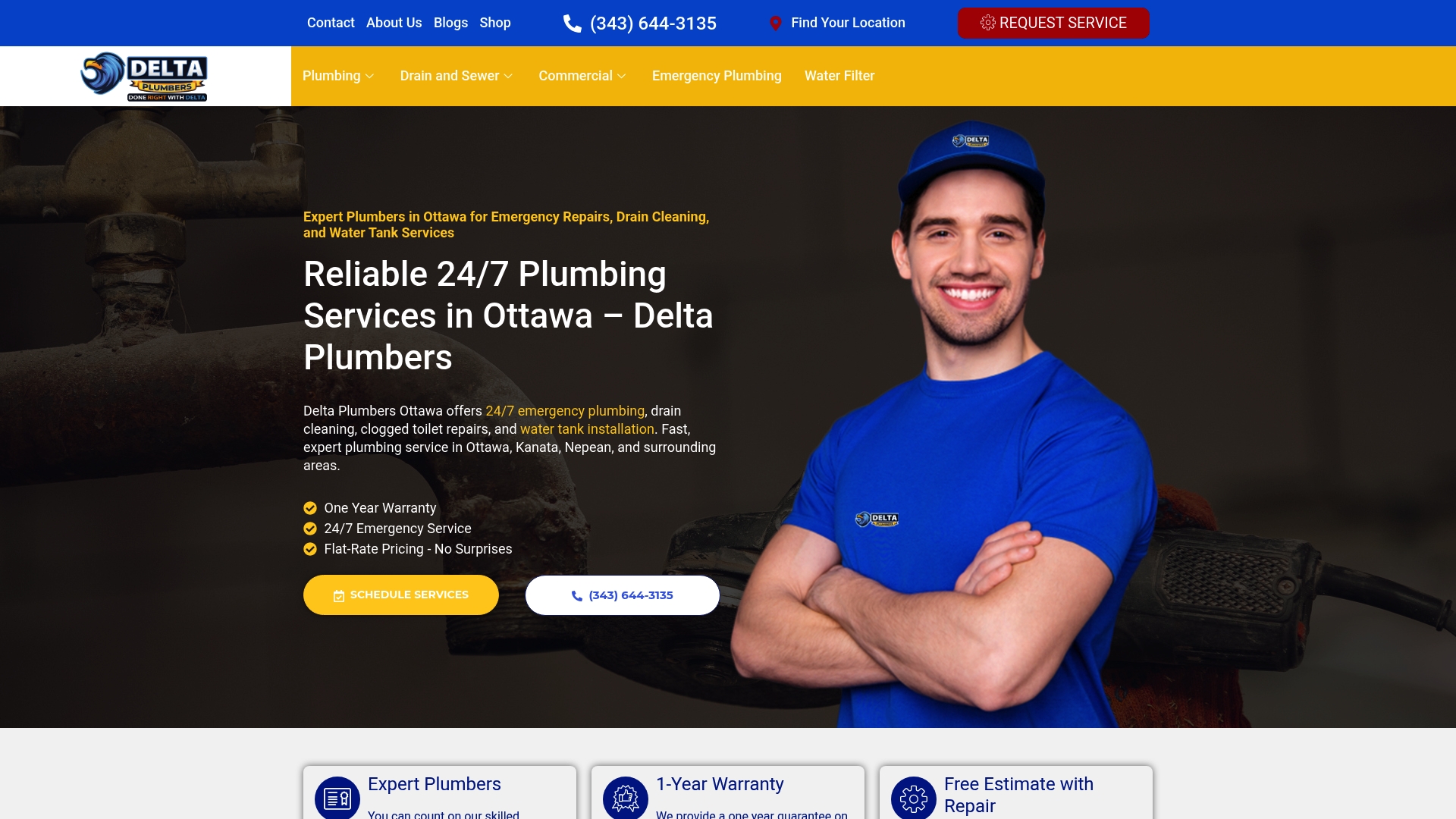
Do not let small issues turn into major headaches. Experience peace of mind with Delta Plumbers, Ottawa’s go-to source for emergency repairs, drain and sewer cleaning, and full-service routine maintenance. Our experienced team is ready 24/7 to provide fast, reliable, and affordable help when you need it most. Explore our Uncategorized Archives for more homeowner resources, or visit https://deltaplumbersottawa.com to schedule your inspection or learn more about our flat-rate pricing and warranty protection. Act now to future-proof your plumbing and avoid costly surprises.
Frequently Asked Questions
How can I prevent plumbing leaks in my home?
Regularly check for leaks under sinks, around toilets, and near your water heater. Monitor your water bills for unexplained increases and address any minor leaks promptly to prevent them from escalating into major issues.
What are the benefits of using water-efficient fixtures?
Water-efficient fixtures, such as low-flow toilets and sensor-activated faucets, can significantly reduce your water consumption, lower your monthly utility bills, and minimize your environmental impact while providing the same performance as traditional fixtures.
How often should I schedule professional plumbing inspections?
Homeowners are advised to schedule professional plumbing inspections at least once a year, or biannually if you live in an older home or have experienced previous plumbing issues. Routine inspections help detect minor problems before they become costly repairs.
What should I do if I discover a leak in my plumbing?
If you discover a leak, immediately turn off the water supply to the affected area, and assess the situation. For minor leaks, you may be able to use temporary sealing materials for quick fixes, but it’s advisable to contact a professional plumber for a thorough assessment and permanent repairs.

